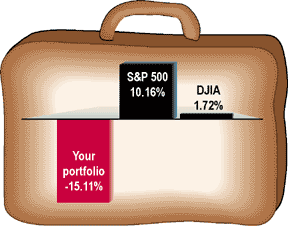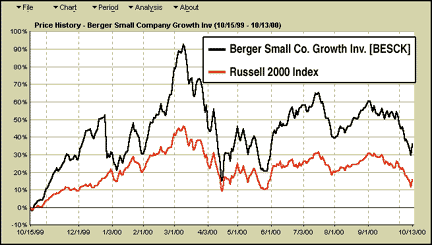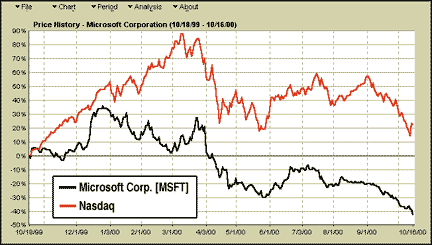
HOT TOPICS LIST
- Strategies
- Stocks
- Buy
- Investing
- Brokers
- Psychology
- Interviews
- Accumulate
- Sell
- Hold
- Spotlight
- Websites
- Candlestick Corner
- Gold & Metals
- Options Trading
LIST OF TOPICS
FINANCIAL PLANNING
Reevaluate Your Portfolio
01/24/01 05:42:31 PM PSTby Han Kim
Don't let your emotions take over. Reevaluate your portfolio periodically -- before panic strikes!
| When was the last time you evaluated your portfolio? Was it the last time the stock market plunged? Don't let a stock market correction be the only reminder that alerts you to reassess your portfolio; looking at your portfolio only when the stock market tumbles is a terrible habit to get into, one that only leads to panic and depression. When emotions get in the way, it's difficult to make the wisest financial decisions. Portfolios should be evaluated periodically. Although most advisors suggest you analyze your portfolio on a yearly basis, I prefer to look at mine every six months. I do so for two reasons. One is to determine whether I am on the right path to reach the investment goals I outlined when I initially created my portfolio. The other is to accommodate any changes in personal circumstances. The investment landscape is constantly changing, so it is to your benefit to see whether your investment objectives are still along the lines of what you originally intended them to be. So how do you know whether you are on the right path?
For example, suppose you own a large-capitalization portfolio consisting of stocks and mutual funds and its performance is similar to the example displayed in Figure 1. It doesn't look good.
After identifying investments that are underperforming their benchmarks, what should you do next? Should you sell them or continue holding them? Your decision to sell stocks should be just as calculated as your decision to buy. Unfortunately, too many investors overlook this factor. One of the most basic rules of thumb is to sell a stock or fund when it stops behaving the way you believed it would based on your research and analysis. If you purchase shares in a hotshot new company and expect the company's stock to continue making a 50% improvement in earnings year after year, it may be a good time to consider selling those shares when those earnings reports start to show a significant dropoff from your expectations. The important factor is to use the same criteria for buying a stock as you do for selling it. If you buy shares in a company after conducting exhaustive research into a company's fundamental financial conditions and discover that it's sound with a positive outlook, then it would be foolish to decide to sell those shares simply based on a short-term review. Along the same lines, if you have shares you acquired after watching their price movement on a chart for weeks or months, then you should not necessarily be swayed by an earnings report that barely meets estimates. Another major factor to keep in mind is time. If you have purchased shares in a company or a mutual fund as part of a long-term investment strategy, then your focus should be on long-term threats to your holdings, not short-term fluctuations. Even the best companies -- Wal-Mart, Cisco Systems, Home Depot -- went through rocky times en route to producing sizable returns for their shareholders. Be wary of buying for great reasons, only to turn around and sell for petty ones! If you are looking to buy shares for the short term -- say, under a year -- then there is little time for fluctuations. One bad move could ruin your entire short-term portfolio! In cases like these, decide how much money you would be able to tolerate losing without having it affect either your material well-being or your sense of self-worth. That amount should be your line of last defense, and a stock that retreats beyond this line should be among the first you consider selling. In general, if the price is declining, earnings are declining, and the overall market is accelerating, it would probably be worthwhile to sell. The primary reason to sell a stock would be to improve your potential and protect your assets. CONCLUSION Monitoring your portfolio takes considerable time and effort. The larger your account, the more time and effort you will need to expend. If your account is less than $10,000, you can probably monitor your own account, but anything beyond that would require consultation with financial professionals. Even if a professional manages your portfolio, it's still a good idea to keep an eye on it. There are several software packages, the two most popular of which are Intuit's Quicken and Microsoft's Money, that will help you analyze your portfolios. All you have to do is enter the data. Until the next time you have to evaluate your portfolio, relax. You can be at peace, knowing your money is working for you. |
Staff Writer
| Title: | Webmaster |
| Company: | Technical Analysis, Inc. |
| Address: | 4757 California AVE SW |
| Seattle, WA 98116 | |
| Phone # for sales: | 206-938-0570 |
| Fax: | 206-938-1307 |
| Website: | working-money.com |
| E-mail address: | hkim@traders.com |
Traders' Resource Links | |
| Charting the Stock Market: The Wyckoff Method -- Books | |
| Working-Money.com -- Online Trading Services | |
| Traders.com Advantage -- Online Trading Services | |
| Technical Analysis of Stocks & Commodities -- Publications and Newsletters | |
| Working Money, at Working-Money.com -- Publications and Newsletters | |
| Traders.com Advantage -- Publications and Newsletters | |
| Professional Traders Starter Kit -- Software | |
PRINT THIS ARTICLE

Request Information From Our Sponsors
- StockCharts.com, Inc.
- Candle Patterns
- Candlestick Charting Explained
- Intermarket Technical Analysis
- John Murphy on Chart Analysis
- John Murphy's Chart Pattern Recognition
- John Murphy's Market Message
- MurphyExplainsMarketAnalysis-Intermarket Analysis
- MurphyExplainsMarketAnalysis-Visual Analysis
- StockCharts.com
- Technical Analysis of the Financial Markets
- The Visual Investor
- VectorVest, Inc.
- Executive Premier Workshop
- One-Day Options Course
- OptionsPro
- Retirement Income Workshop
- Sure-Fire Trading Systems (VectorVest, Inc.)
- Trading as a Business Workshop
- VectorVest 7 EOD
- VectorVest 7 RealTime/IntraDay
- VectorVest AutoTester
- VectorVest Educational Services
- VectorVest OnLine
- VectorVest Options Analyzer
- VectorVest ProGraphics v6.0
- VectorVest ProTrader 7
- VectorVest RealTime Derby Tool
- VectorVest Simulator
- VectorVest Variator
- VectorVest Watchdog



